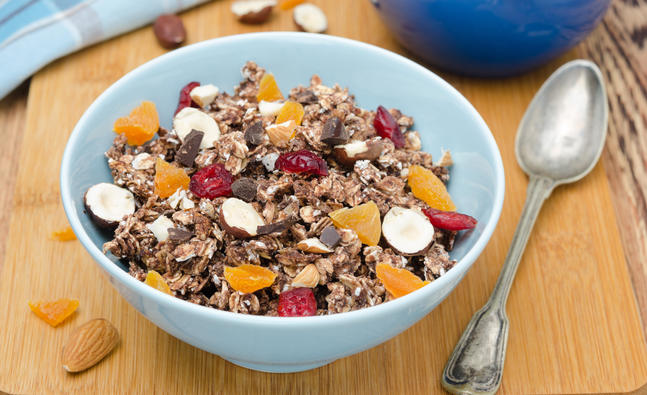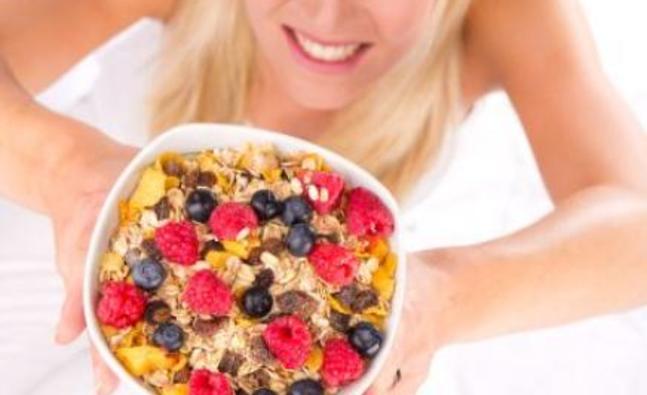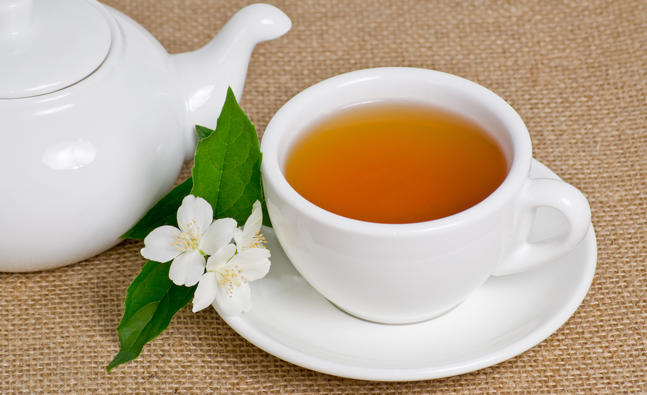Everyone Is Obsessed with the MIND Diet, but What Exactly Is It?
The latest diet to take the interwebs by storm doesn't promise to help you drop 15 pounds in two weeks or cleanse your body of toxins; instead, it’s supposed to drastically reduce your risk of Alzheimer’s—and potentially help you lose weight. Nope, it's not sexy, but it is science-backed.
In a recent study from the Rush University Medical Center, researchers found that the MIND diet, a hybrid of the Mediterranean and DASH (Dietary Approaches to Stop Hypertension) diets, cut people’s risk of Alzheimer’s by an average of 53 percent. Not too shabby.
U.S. News & World Report just named MIND America’s easiest to follow diet—good news since the study also found that the longer people stuck with the diet, the greater their benefits—but we were still curious about how it actually works, so we called in an expert.
What's on the Menu
Short for the Mediterranean-DASH Intervention for Neurodegenerative Delay diet, the MIND diet emphasizes 10 brain-healthy foods included in both the Mediterranean and DASH diets: leafy greens, vegetables, nuts, berries, beans, whole grains, fish, poultry, olive oil, and wine. Meanwhile, it limits intake of red meat, butter and margarine, cheese, pastries and sweets, and fried or fast food.
All of those make for a good balance, says Kate Patton, R.D., a registered dietician with the Cleveland Clinic. “The combination of lean protein, heart- and brain-healthy omega 3s, antioxidants, and fiber, as well as low levels of added sugar and saturated and trans fat reduces inflammation to help cut your risk of dementia,” she says. In fact, a 2015 review published in Nature suggests that inflammation may trigger and speed up the development of Alzheimer’s disease.
Guidelines
You've got the freedom to eat pretty much whatever you want—just in moderation. The guidelines are extremely loose, giving you lots of wiggle room to eat the foods you love. And, if you still fudge the rules every now and then, it’s not the end of the world. The study that looked into the impact of the MIND diet found that even people who didn’t follow the diet to a T still reduced their risk of Alzheimer’s by 35 percent.
What to Avoid
Red meat: Eat fewer than four servings per week.
Sweets and pastries: Aim to eat fewer than five servings per week.
Butter, margarine, cheese, and fried and fast food: Cap intake at one serving per week.
What to Add
Every day: Consume at least three servings of whole grains, a leafy salad, another vegetable, and a glass of wine (that's not a typo). Use olive oil as your primary cooking fat.
On most days: Snack on nuts.
Every other day: Eat half a cup of beans.
At least twice a week: Serve up poultry and a half-cup serving of berries.
At least once a week: Fill up on fish.
How It’s Different
It's pretty simple compared to the other crazy diets taking up valuable real estate on Pinterest, right? There’s no daily calorie limit, specific timing for each meal, rules about snacks, or elimination of food groups. That’s because the diet’s sole focus is to increase your intake of foods that are healthy for your brain, and cut back on those that can sap your smarts, Patton says. It’s more of a lifestyle and less of a “diet,” which is probably why it's gaining popularity for being easy to stick to.
Extra Perk
While we’re all for boosting your brain power, studies also show that the foods featured in this diet can help you lose weight, which is great if that's a goal. A 2015 study links food additives to inflammation and weight gain, and a Journal of Nutrition study shows that switching from refined to whole grains reduces weight and body fat. Plus, let’s face it, most of us are going to lose weight if we cut down on added sugar from sweets, trans fats in fried food, and eat more veggies and whole grains.
Still, in order to lose weight and keep it off on the MIND diet, Patton says you should add in a couple of extra rules for safe measure. First and foremost, you need to watch your portion sizes. Case in point: Even though olive oil is a healthy staple in the diet, a single tablespoon contains 119 calories. “Eat too much of anything, even healthy foods, and you will gain weight,” she says. While you don’t have to count calories to lose weight, remember that just because a food is healthy, it doesn’t mean it’s low-cal—and in the end, you have to consume fewer calories than you’re burning to lose weight.
Next up, pair any carbs consumed, whether as a meal or a snack, with protein. Even though the MIND diet’s healthy whole grains and fruits are rich in feel-full, blood sugar-regulating fiber, protein doubles fiber’s efforts, says Patton. By slowing the digestion process and triggering the release of powerful satiety hormones, eating protein helps you prevent sugar crashes, cravings, and, ultimately, hit your healthiest weight.
-
Get motivated to lose weight with cash incentives
-
The Most Important Time for Weight Loss
Ever notice how your jeans tend to seem a little tight come Monday mor
-
Lose weight together!
-
Book a free assessment and you could win R500,00 off your TLC program
-
How to avoid desk job weight gain
-
Use smaller kitchen utensils
- DON'T MISS
- Fashionable nutrition myths: Fruit juice vs fresh fruit
- A Magic Pill?
- Ups and downs for steady weight loss
- Drink ice water and lose weight quicker
- How to Calculate How Many Calories You REALLY Need
- Join the Real Meal Revolution and lose weight
- Antidepressants could cause weight gain
- Chewing gum burns calories
- How To Lose Thigh Fat
- Speed up weight loss: Stop this everyday habit




